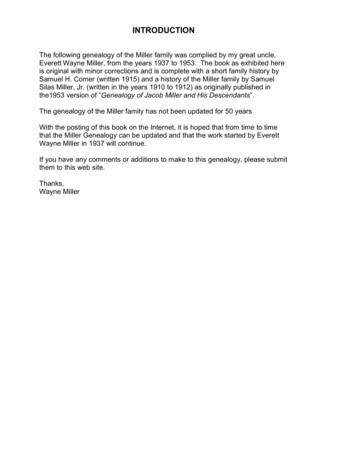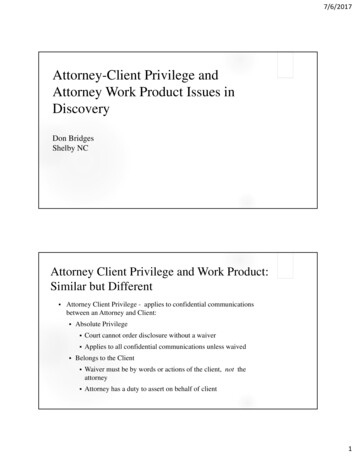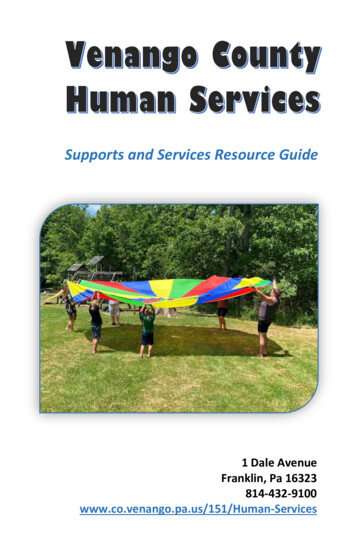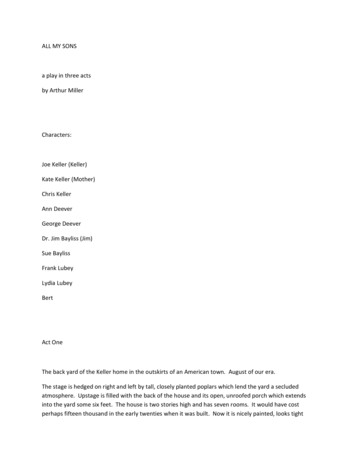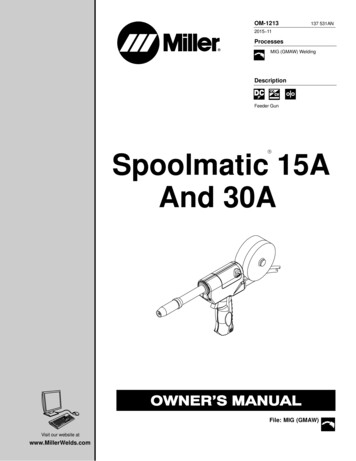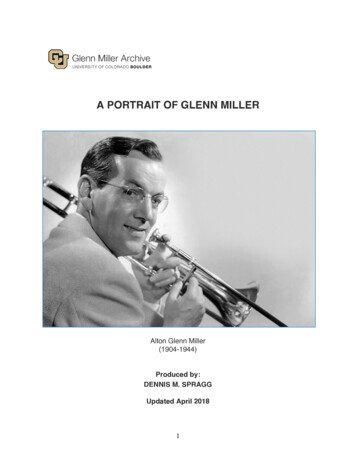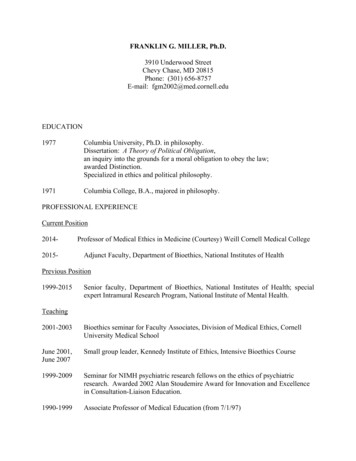
Transcription
FRANKLIN G. MILLER, Ph.D.3910 Underwood StreetChevy Chase, MD 20815Phone: (301) 656-8757E-mail: fgm2002@med.cornell.eduEDUCATION1977Columbia University, Ph.D. in philosophy.Dissertation: A Theory of Political Obligation,an inquiry into the grounds for a moral obligation to obey the law;awarded Distinction.Specialized in ethics and political philosophy.1971Columbia College, B.A., majored in philosophy.PROFESSIONAL EXPERIENCECurrent Position20142015-Professor of Medical Ethics in Medicine (Courtesy) Weill Cornell Medical CollegeAdjunct Faculty, Department of Bioethics, National Institutes of HealthPrevious Position1999-2015Senior faculty, Department of Bioethics, National Institutes of Health; specialexpert Intramural Research Program, National Institute of Mental Health.Teaching2001-2003Bioethics seminar for Faculty Associates, Division of Medical Ethics, CornellUniversity Medical SchoolJune 2001,June 2007Small group leader, Kennedy Institute of Ethics, Intensive Bioethics Course1999-2009Seminar for NIMH psychiatric research fellows on the ethics of psychiatricresearch. Awarded 2002 Alan Stoudemire Award for Innovation and Excellencein Consultation-Liaison Education.1990-1999Associate Professor of Medical Education (from 7/1/97)
University of Virginia, Center for Biomedical Ethics.Courses taught included: Foundations of Bioethics, Bioethics InternshipSeminar, Introduction to Clinical Ethics, Clinical Ethics Proseminar, Figures andTraditions in Philosophical and Religious Ethics, History of Bioethics via theGreat Cases, and Issues in Bioethics.1998The New York Hospital-Cornell Medical Center, Advanced Seminar in MedicalEthics.1975-76Kean College of New Jersey, taught course onphilosophy of law.1973-74Columbia University, School of General Studies,taught course on introduction to moral philosophy.Consultation in Biomedical Ethics2016-17Member of Planning Group and Writing Group for NIH Consultation on theEthics of ZIKV Human Challenge Trials2015-Ethics consultant, Jewish Social Service Agency Hospice Program2012-2015Member of Data Safety and Monitoring Board, NIMH Intramural ResearchProgram9/1/12-2013Member of Data Safety and Monitoring Board, PITCH-HF, National Heart, Lung,and Blood Institute3/5/08-2010Member of Protocol Review Committee, Cardiothoracic Surgical Trials Network,National Heart, Lung, and Blood Institute2/8/08Member of NIH Study Section, Research on Ethical Issues in Human Studies2007-2012Member of Data Safety Monitoring Committee, Comparison of Age-relatedMacular Degeneration Treatment Trials, National Eye Institute1991-2006Member of Institutional Review Board, National Institute of Mental Health.2007-2012Member of CNS Institutional Review Board, Intramural Research Program,National Institutes of Health2012-2014Member of NHLBI Institutional Review Board,2
Intramural Research Program, National Institutes of Health1990-2010Member of Ethics Committee, Clinical Center, National Institutes of Health.2001-2004Member of Data Safety and Monitoring Board, National Institute of MentalHealth1/9/04Member, Protocol Review Committee for the Coronary Revascularization inDiabetic Patients with Multivessel Disease Trial, sponsored by the National Heart,Lung, and Blood Institute.1995-2003Member of Ethics Committee, Jewish Social Service Agency of MetropolitanWashington, Home Care Services and Hospice.1997-2000Member of Data Safety and Monitoring Board for Clinical Studies of ChronicLyme Disease, sponsored by National Institute of Allergy and InfectiousDiseases.1996-1998Consultant Ethicist to The New York Hospital: consultation in research andprogram planning concerning improving the care of hospitalized dyingpatients.4/6/98Member of NIAID Expert Panel on Effects of Donor Pool Size on Safety andEfficacy of Immunoglobulin Products.1993-97Member of Data Safety and Monitoring Board for clinical trial of HIVHyperimmune globulin in HIV-infected pregnant woman to prevent verticaltransmission of HIV, sponsored by National Heart, Lung, and Blood Institute.6/26/95Member of Ad Hoc Panel to Review Randomized Clinical Trial of T-cellDepletion in Unrelated Donor Marrow Transplantation, convened by NationalHeart, Lung, and Blood Institute.1988-90Counselor to Biomedical Ethics Program, University of Virginia: help inorganizing a Center for Biomedical Ethics, program development, andfinancial planning.1985-90Member of Institutional Review Board, National Institute of Child Health andHuman Development.3
Planning and Program Development1977-82Vera Institute of Justice, New York City, Project Director from 197982, Senior Planner from 1977-79: responsible for planning, technical assistance,program development, and research in child welfare and juvenile justice.PUBLICATIONSArticlesGrady C, . . . Miller FG, et al. So much at stake: ethical tradeoffs in accelerating SARS CoV-2vaccine development. Vaccine 2020, in press.Shah SK, Lynch HF, Miller FG. The role of community engagement in addressing bystanderrisks in research: the case of a Zika virus controlled human infection study. Bioethics 2020 inpress.Halpern SD, Truog RD, Miller FG. Cognitive bias and public health policy during the COVID19 pandemic. JAMA 2020.Fins JJ, Miller FG. Proportionality, pandemics, and medical ethics. American Journal ofMedicine 2020.Nair-Collins M, Miller FG. Current practice diagnosing brain death is not consistent with legalstatutes requiring the absence of all brain function. Journal of Intensive Care Medicine 2020, inpress.Kaptchuk TJ, Hammond CC, Miller FG. Placebos in chronic pain: evidence, theory, ethics, anduse in clinical practice. BMJ 2020, in press.Bernstein MH, . . . Miller FG, . . . Primary care providers’ use of and attitudes towards placebos:an exploratory focus group study with US physicians. British Journal of Health Psychology2020, in press.Miller FG. The ethics of everyday life in the midst of a pandemic. Hastings Center Report2020; 50 (3):6-7.Shah SK, Miller FG, Darton TC, et al. Ethics of controlled human infection to address COVID19. Science 2020; 368:832-4.Halpern SD, Miller FG. The urge to build intensive care unit beds and ventilators: intuitive buterrant. Annals of Internal Medicine 2020, in press.Miller FG. Bioethics as a vocation. Perspectives in Biology and Medicine, 2020;63:4294
-43.Miller FG. Revisiting the distinction (and the connection) between research and practice.Perspectives in Biology and Medicine. 2020;63:277-292.Hendriks S, . . . Miller FG, et al. Ethical challenges of risk, informed consent, and posttrialresponsibilities in human research with neural devices: a review. JAMA Neurology 2019, inpress.Kaptchuk TJ, Miller FG. Open label placebo: can honestly prescribed placebos evokemeaningful therapeutic benefit? BMJ 2018.Miller FG. On collaboration in bioethics scholarship. Perspectives in Biology and Medicine2019;62:31-40.Jansen LA, Wall S, Miller FG. Drawing the line on physician-assisted death. Journal ofMedical Ethics 2019;45:190-7.Miller FG, Reining in the placebo effect. Perspectives in Biology and Medicine 2018;61:335-48.Miller FG, Dickert N. The ethics of study design and conduct in cardiology: the limits andhazards of clinical equipoise. JAMA Cardiology 2018;3:791-2.Shah SK, . . . Miller FG, et al. Bystander risk, social value, and ethics of human research.Science 2018;368:158-9.Dickert NW, Miller FG. Sham-controlled trials for coronary interventions: Ethically acceptableand ethically important. Journal of the American College of Cardiology 2018;71:95-7.McGee A, Miller FG. Advice and care for patients who die by voluntarily stopping eating anddrinking is not assisted suicide. BMC Medical Care 2017;17:222.Dickert NW . . . Miller FG et al. Reframing consent for clinical research: a function-basedapproach. American Journal of Bioethics 2017; 17:3-11.Nair-Collins M, Miller FG. Do the ‘brain dead’ merely appear to be alive? Journal of MedicalEthics 2017;43:747-53.Nugent AC, Miller FG. The ethics of clinical trials research in severe mood disorders. Bioethics2017;31:443-53.Charlesworth JEG, . . . Miller FG, et al. Effects of placebo without deception compared with notreatment: A systematic review and meta-analysis. Journal of Evidence Based Medicine2017;10:97-107.5
Miller FG, Appelbaum PS. Physician-assisted death for psychiatric patients—misguided publicpolicy. New England Journal of Medicine 2018;378:883-5.Miller FG. Challenging the conventional wisdom: from philosophy to bioethics. Perspectivesin Biology and Medicine 2017;60:3-18.Miller FG. Should a legal option of physician-assisted death include those who are “tired oflife”? Perspectives in Biology and Medicine. 2016;59:351-63.Miller FG. Henry Beecher and consent to research: a critical re-examination. Perspectives inBiology and Medicine 2016;59:78-94.Barnhill A, Joffe S, Miller FG. The ethics of infection challenges in primates. Hastings CenterReport 2016;46(4):20-26.Nugent AC, . . . Miller FG, et al. Safety of research into severe and treatment-resistant mooddisorders: analysis of outcome data for 12 years of clinical trials at the US National Institute ofMental Health. Lancet Psychiatry 2016;3:436-42.Cassel JB, Miller FG. Phase 1 cancer trials and palliative care: antagonism, irrelevance, orsynergy? Journal of Pain and Symptom Management 2016;52:437-45.Rid A, Miller FG. Rationale for the Ebola “ring vaccination” trial design. American Journal ofPublic Health 2016;106:432-5.Miller FG. On changing one’s mind in bioethics, Perspectives in Biology and Medicine2015;58:507-17.Colloca L, . . . Miller FG, et al. Vasopressin boosts placebo effects in women: a randomizedtrial. Biological Psychiatry 2016;79:794-802.Kim S, Miller FG. Ethical complexities in standard of care randomized trials: a case study ofmorning versus nighttime dosing of blood pressure drugs. Clinical Trials 2015;12:557-63.Nayak R, Wendler D, Miller FG, Kim S. Pragmatic trials without standard informed consent: anational survey. Annals of Internal Medicine 2015;163:356-64.Dickert N, Miller FG. Involving patients in enrollment decisions for acute myocardialinfarction trials. BMJ 2015;July 29; 351:h3791.Kaptchuk TJ, Miller FG. Placebo effects in medicine. New England Journal 2015;373:8-9.Barnhill A, Miller FG. The ethics of placebo treatments in clinical practice: a reply to Glackin.Journal of Medical Ethics 2015;41:673-76.6
du Toit J, Miller FG. The ethics of continued life-sustaining treatment for those diagnosed asbrain dead. Bioethics 2016;30:151-8.Miller LR, Miller FG. Understanding placebo effects: implications for nursing practice.Nursing Outlook 2015;63:601-6.Miller FG, Kim SYH. Personal care in learning health care systems. Kennedy Institute ofEthics Journal 2015;25:419-35.Kim S, Miller FG. Varieties of standard-of-care treatment randomized trials: ethicalimplications. JAMA 2015;313:895-6.Annoni M, Miller FG. Placebos in clinical practice: an overview, Douleur et Analgesie, inpress.Annoni M, Miller FG. The ethics of therapeutic communication: a pragmatic perspective,Kennedy Institute of Ethics 2016;26: 79-103.Miller FG, Joffe S, Kesselheim A. Evidence, errors, and ethics. Perspectives in Biology andMedicine 2014;57:299-307.Colloca L, Jonas WB, Killen J, Miller FG, Shurtleff D. Reevaluating the placebo effect inmedical practice. Z Psychology 2014;222(3):124-7.Kim S, Miller FG. Waivers and alterations to consent in pragmatic trials. IRB 2016;38(1):1-5.Gelinas L, Wertheimer A, Miller FG. When and why is research without consent permissible.Hastings Center Report 2016;46(2):35-43.Barnhill A, Miller FG. Placebo and deception: a commentary. Journal of Medicine andPhilosophy 2015;40:69-82.Moustgaard H, . . . Miller FG, et al. Outcome classification in randomised clinical trials:definitions of subjects and objective outcomes differed in methods publications but were absentfrom trial reports. Journal of Clinical Epidemiology 2014;67:1327-34.Geers A, Miller FG. Understanding and translating knowledge about placebo effects: thecontribution of psychology. Current Opinion in Psychiatry 2014;27:326-31.Joffe S, Miller FG. The ethics of cancer clinical trials in low-resource settings. Journal ofClinical Oncology 2014;32:3192-6.Truog RD, Miller FG. The meaning of brain death: a different view. JAMA Internal Medicine2014;174:1215-6.7
Truog RD, Miller FG. Defining death: the importance of scientific candor and transparency.Intensive Care Medicine 2014;40:885-7.Truog RD, Miller FG. Changing the conversation about brain death. American Journal ofBioethics 2014;14(8):9-14.Shah SK, Kasper K, Miller FG. A narrative review of the empirical evidence on public attitudeson brain death and vital organ transplantation: the need for better data to inform policy. Journalof Medical Ethics 2015;41:291-6.Dickert NW, Miller FG. Learning from FAME: The need for sham controls in trials of stablecoronary disease. JACC: Cardiovascular Interventions 2014;7:342-4.Nayak RK, Pearson SD, Miller FG. Cost-related motivations for conducting research:participants should be informed, JAMA 2014;311:1491-2.Kim S, Miller FG. Informed consent for pragmatic randomized clinical trials: the integratedconsent model, New England Journal 2014;370:769-772.Miller FG. The Stateville Penitentiary malaria experiments: a case study in retrospectiveethical assessment, Perspectives in Biology and Medicine 2013;56:548-67.Wendler D, Miller FG. The ethics of peer review in bioethics, Journal of Medical Ethics2014;40:697-701.Truog RD, Miller FG, Halpern S. The dead donor rule and the future of organ donation, NewEngland Journal 2013;369:1287-9.Miller FG. Clinical research before informed consent. Kennedy Institute of Ethics Journal2014;24:141-57.Brody H, Miller FG. The research/clinical practice distinction, learning health systems, andrelationships. Hastings Center Report 2013;43(4):41-7.Hull S, . . . Miller FG. A survey of patients’ attitudes about the use of placebo treatments, BMJ2013;346:f3757 doi: 10.1136/bmj.f3757.Miller FG. Two philosophical deaths: Hume and Hitchens, Perspectives in Biology andMedicine 2013;56:251-58.Brim R, Miller FG. The potential benefit of the placebo effect in sham-controlled trials:implications for risk/benefit assessment and informed consent, Journal of Medical Ethics2013;39:703-7.8
Miller FG, Joffe S. Phase 1 oncology trials and informed consent, Journal of Medical Ethics2013;39:761-4.Miller FG. The enduring legacy of sham-controlled trials of internal mammary artery ligation,Progress in Cardiovascular Diseases 2012;55:246-50.Sommers R, Miller FG. Forgoing debriefing in deceptive research: is it ever ethical?Ethics and Behavior 2013;23:98-116.Rhodes K, Miller FG. Simulated patient studies: an ethical analysis, Milbank Quarterly2012;90:706-24.Miller FG. Clinical equipoise and risk-benefit assessment, Clinical Trials 2012;9:621-7.Miller FG. Homage to Henry Beecher, Perspectives in Biology and Medicine 2012;55:218-29.Largent E, Grady C, Miller FG, Wertheimer A. Misconceptions about coercion and undueinfluence. Bioethics 2013;27:500-7.Brody H, Colloca L, Miller FG. The placebo phenomenon: implications for the ethics of shareddecision-making. Journal of General Internal Medicine 2012;27:739-42.Joffe S, Miller FG. Equipoise: asking the right questions for clinical trial design. NatureReviews Clinical Oncology 2012;9(4):230-5.Sinnot-Armstrong W, Miller FG. Why killing by itself is not morally wrong. Journal ofMedical Ethics 2013;39:3-7.Brody H, Miller FG. From art to science: what has recent research taught us about the placeboeffect in clinical practice? JAMA 2011;306:2612-3.Largent E, Grady C, Miller FG, Wertheimer A. Money, coercion, and undue inducement:attitudes about payment to research participants, IRB 2012;34(1):1-8.Wulff K, Miller FG, Pearson SD. Can coverage be rescinded when negative results threaten apopular procedure? The ongoing saga of vertebroplasty. Health Affairs 2011;30:2269-76.Miller FG, Pearson SD. Linking insurance coverage for innovative invasive procedures withparticipation in clinical research, JAMA 2011;306:2024-5.Shah SK, Truog RD, Miller FG. Death and legal fictions. Journal of Medical Ethics2011;37:719-22.Colloca L, Miller FG. The nocebo effect and its relevance for clinical practice. PsychosomaticMedicine 2011;73:598-603.9
Miller FG. Dispensing with equipoise. American Journal of the Medical Sciences2011;342:276-81.Miller FG. Research and complicity: the case of Julius Hallervorden. Journal of MedicalEthics 2012;38:53-56.Miller FG, Joffe S. Balancing access and evaluation in the approval of new cancer drugs.JAMA 2011;305:2345-6.Miller FG, Wertheimer A. The fair transaction model of informed consent: an alternative toautonomous authorization, Kennedy Institute of Ethics Journal 2011;21:201-18.Lie RK, Miller FG. What counts as reliable evidence for public health policy: the case ofcircumcision for preventing HIV infection. BMC Medical Research Methodology 2011;11:34.Miller FG, Colloca L. The placebo phenomenon and medical ethics: rethinking the relationshipbetween informed consent and risk-benefit assessment. Theoretical Medicine and Bioethics2011;32:229-43.Miller FG, Kallmes DF, Buchbinder R. Vertebroplasty and the placebo response. Radiology2011;259:621-5.Hrobjartsson A, Kaptchuk TJ, Miller FG. Placebo effect studies are susceptible to responsebiases and other types of biases. Journal of Clinical Epidemiology 2011;64:1223-9.Colloca L, Miller FG. Role of expectation in health. Current Opinion in Psychiatry2011;24:149-55.Colloca L, Miller FG. How placebo responses are formed: a learning perspective.Philosophical Transactions B 2011;366:1859-69.Colloca L, Miller FG. Harnessing the placebo effect: the need for translational research.Philosophical Transactions B 2011;366:1922-30.Miller FG, Joffe S. Equipoise and the randomized clinical trial dilemma. New England Journalof Medicine 2011;364:476-80.Largent E, Joffe S, Miller FG. Can research and care be ethically integrated? Hastings CenterReport 2011;41(4):37-46.Kaptchuk TJ, . . . Miller FG, et al. Placebos without deception: a randomized controlled trial inirritable bowel syndrome, PLoS One 2010;5(12):e15591.10
Litton P, Miller FG. What do physicians-investigators owe patients who participate in research?JAMA 2010;304:1491-2.Miller FG, Colloca L. Semiotics and the placebo effect. Perspectives in Biology and Medicine2010;53:509-16.Miller FG, Kallmes DF. The case of vertebroplasty trials: promoting a culture of evidencebased procedural medicine. Spine 2010;35:2023-26.Lev O, Miller FG, Emanuel EJ. The ethics of research on enhancement interventions. KennedyInstitute of Ethics Journal 2010;20:101-13.Resnik DB, Miller FG. The ethics of sham surgery on research subjects with cognitiveimpairments that affect decision-making capacity. Contemporary Clinical Trials 2010;31:40710.Miller FG, Truog RD. Decapitation and the definition of death, Journal of Medical Ethics2010;36:632-4 .Shah S, Miller FG. Can we handle the truth? Legal fictions in the determination of death,American Journal of Law and Medicine 2010;36:540-585.Tilburt JC, Miller FG, et al. Factors that influence practitioners’ interpretation of evidence fromalternative medicine trials: a factorial vignette experiment embedded in a national survey.Medical Care 2010;48:341-8.Miller FG, Brody H. Understanding and harnessing the placebo effect: clearing away theunderbrush. Journal of Medicine and Philosophy 2011;36:69-78.Largent EA, Wendler D, Emanuel EJ, Miller FG. Is Emergency research without initial consentjustified? The consent substitute model. Archives of Internal Medicine 2010;170:668-74.Heyd D, Miller FG. Life plans: do they give meaning to our lives. Monist 2010;93:17-37.Finniss DG, Kaptchuk TJ, Miller F, Benedetti F. Placebo effects: biological, clinical, andethical advances, Lancet 2010;375:686-95.Curlin FA, Rasinski KA, Kaptchuk TJ, Emanuel EJ, Miller FG, Tilburt JC. Religion, clinicians,and the integration of complementary and alternative medicine. Journal of Complementary andAlternative Medicine 2009;15:987-94.Miller FG, Truog RD, Brock DW. The dead donor rule: can it withstand critical scrutiny?Journal of Medicine and Philosophy 2010;35:299-312.11
Miller FG, Colloca L, Kaptchuk TJ. The placebo effect: illness and interpersonal healing,Perspectives in Biology and Medicine 2009;52:518-39.Largent, Miller FG, Pearson SD. Going off-label without venturing off-course: evidence andethical off-label prescribing, Archives of Internal Medicine 2009;169:1745-47.Miller FG, Colloca L. The legitimacy of placebo treatments in clinical practice: evidence andethics, American Journal of Bioethics 2009;9(12): 39-47.Miller FG. Death and organ donation: back to the future. Journal of Medical Ethics2009;35:616-20.Miller FG, Joffe S. Limits to research risks. Journal of Medical Ethics 2009;35:445-449.Miller FG, Truog RD. The incoherence of determining death by neurological criteria:Commentary on Controversies in the Determination of Death, A White Paper by the President’sCouncil on Bioethics. Kennedy Institutes of Ethics Journal 2009;19:185-93.Miller FG, Truog RD, Brock DW. Moral fictions and medical ethics. Bioethics 2010;24;45360; reprinted in Bioethics: An Anthology, 3d edition, ed. by H. Khuse, U. Schuklenk, and P.Singer, John Wiley & Sons, Inc., 2016.Miller FG. A planned death in the family. Hastings Center Report 2009;39(2):28-30.Tilburt J, Curlin FA, Kaptchuk TJ, Clarridge B, Bolcic-Jankovic D, Emanuel EE, Miller FG.Alternative medicine research in clinical practice: A U.S. national survey. Archives of InternalMedicine 2009;169:670-77.O’Neil C, Miller FG. When scientists deceive: applying the federal regulations. Journal ofLaw, Medicine & Ethics 2009;37:344-50.Tilburt JC, Emanuel EJ, Kaptchuk TJ, Curlin FA, Miller FG. Prescribing “placebo treatments”in clinical practice: results of a national survey of U.S. internists and rheumatologists. BMJ2008;337:a1938.Miller FG, Joffe S. Benefit in phase 1 oncology trials: therapeutic misconception or reasonabletreatment option? Clinical Trials 2008;5:617-23.Peppercorn J, . . . Miller FG, et al. Self-reported practices and attitudes of U.S. oncologistsregarding off-protocol therapy. Journal of Clinical Oncology 2008;26:5994-6000.Truog RD, Miller FG. The dead donor rule and organ donation. New England Journal2008;359:674-5.12
Miller FG, Gluck JP, Wendler D. Debriefing and accountability in deceptive research. KennedyInstitute of Ethics Journal 2008;18:235-51.Tilburt JC, Miller FG, Emanuel EJ. Does the evidence make a difference in consumerbehavior? Sales of supplements before and after publication of negative research results.Journal of General Internal Medicine 2008;23:1495-98.Miller FG, Kaptchuk TJ. The power of context: reconceptualizing the placebo effect. Journalof the Royal Society of Medicine 2008;101:222-25.Miller FG. Collaborative research in bioethics, American Philosophical Association, Newsletteron Medicine and Philosophy 2008;7(2):17-20.Brown AP, Wendler D, Camphausen KA, Miller FG, Citrin D. Performing non-diagnosticresearch biopsies in irradiated tissue: a review of scientific, clinical, and ethical considerations,Journal of Clinical Oncology 2008;26:3987-94.Miller FG, Kaptchuk. Deception of subjects in neuroscience: an ethical analysis, Journal ofNeuroscience 2008;28:4841-43.Miller FG, Truog RD. An apology for Socratic bioethics, American Journal of Bioethics2008;8(7):3-7.Miller FG, Truog RD. Rethinking the ethics of vital organ donations, Hastings Center Report2008;38(6):38-46; reprinted in ASBH Reader Spring 2009.Brendel D, Miller FG. A plea for pragmatism in clinical research ethics, American Journal ofBioethics 2008;8(4):24-31.Miller FG. Research on medical records without informed consent, Journal of Law, Medicine &Ethics 2008;36:560-66.Shalowitz D, Miller FG. Communicating the results of clinical research to participants:Attitudes, practices, and future directions. PLoS Medicine 2008;5(5):e91.Miller FG, Emanuel EJ. Quality improvement research without informed consent, New EnglandJournal of Medicine 2008;358:765-67.Joffe S, Miller FG. Bench to bedside: mapping the moral terrain of clinical research, HastingsCenter Report 2008;38(2):30-42.Miller FG, Mello MM, Joffe S. Incidental findings in human subjects research: What doinvestigators owe research participants? Journal of Law, Medicine & Ethics 2008;36:271-79.13
Miller FG, Pearson SD. Coverage with evidence development: ethical issues and policyimplications. Medical Care 2008;46:746-57.Henderson GE, . . . Miller FG, et al. Defining the therapeutic misconception: problems andprospects. PLoS Medicine 2007;4(11):e324.Wertheimer A, Miller FG. Payment for research participation: A coercive offer? Journal ofMedical Ethics 2008;34:389-92.Horng S, Miller FG. Placebo controlled procedural trials for neurological conditions.Neurotherapeutics 2007;4:531-6.Miller FG, Wendler D. Is it ethical to keep interim findings of randomized controlled trialsconfidential? Journal of Medical Ethics 2008;34:198-201.Tilburt J, Miller FG. Responding to medical pluralism in practice: a principled ethicalapproach. Journal of the American Board of Family Medicine 2007;20:489-94.Buchanan D, Miller FG, Wallerstein N. Ethical issues in community based participatoryresearch: balancing rigorous research with community participation in intervention studies.Progress in Community Health Partnerships 2007;1.2:153-160.Miller FG, Wertheimer A. Facing up to paternalism in research ethics. Hastings Center Report2007;37(3):24-34.Pearson SD, Miller FG, Emanuel EJ. Medicare’s requirement for research participation as acondition for coverage: Is it ethical? Journal of the American Medical Association2006;296:988-91.Emanuel EJ, Miller FG. Money and distorted ethical judgments about research: Ethicalassessment of the TeGenero TGN1412 trial. American Journal of Bioethics 2007;7(2):76-81.Miller FG, Brody H. Clinical equipoise and the incoherence of research ethics. Journal ofMedicine and Philosophy 2007;32:151-65.Miller FG, Joffe S. Evaluating the therapeutic misconception. Kennedy Institute of EthicsJournal 2006;16:353-66.Joffe S, Miller FG. Rethinking risk-benefit assessment for phase I cancer trials. Journal ofClinical Oncology 2006;24:2987-90.Buchanan D, Miller FG. A public health perspective on research ethics. Journal of MedicalEthics 2006;32:729-33.14
Miller FG, Kaptchuk TJ. Acupuncture trials and informed consent. Journal of Medical Ethics2007;33:43-44.Groopman L, Miller FG, Fins JJ. The patient’s work. Cambridge Quarterly of HealthcareEthics 2006;16:44-52. Reprinted in J. Pierce, G. Randels, eds., Contemporary Bioethics: AnIntegrated Approach, Oxford University Press, 2009.Miller FG. Revisiting the Belmont Report: the ethical significance of the distinction betweenclinical research and medical care. American Philosophical Association, Newsletter on Medicineand Philosophy 2006;5(2):10-14.Wendler D, Miller FG. Assessing research risks systematically: the net risks test. Journal ofMedical Ethics 2007;33:481-6.Miller FG, Wendler D. The relevance of empirical research in bioethics. SchizophreniaBulletin 2006;32:37-41.Shalowitz D, Miller FG. Disclosing individual results of clinical research: the implications ofrespect for participants. JAMA 2005;294:737-40.Miller FG, Wendler D, Swartzman L. Deception in research on the placebo effect. PLoSMedicine 2005;2(9):e262.Miller FG. Ethical issues in surgical research. Thoracic Surgery Clinics 2005;15:543-54.Buchanan D, Miller FG. Justice and fairness in the Kennedy Krieger Institute lead paint study:the ethical justification for public health research on less expensive yet less effectiveinterventions. American Journal of Public Health 2006;96:781-87.MacKenzie R, Miller FG, Fins JJ. Justice and health care in rheumatic diseases. HSS Journal,2005;1:58-63.Miller FG, Brody H. Professional integrity in industry-sponsored clinical trials. AcademicMedicine 2005;80:899-904.Miller FG, Rosenstein DL. The nature and power of the placebo effect. Journal of ClinicalEpidemiology 2006;59:331-35.Litton P, Miller FG. A normative justification for distinguishing the ethics of clinical researchfrom the ethics of medical care. Journal of Law, Medicine & Ethics 2005;33:566-74.Brody H, Miller FG, Bogdan-Lovis E. Evidence-based medicine: watching out for its friends.Perspectives in Biology and Medicine 2005;48:570-84.15
Buchanan D, Miller FG. Principles of early stopping of randomized trials for efficacy: acritique of equipoise and an alternative ethical framework. Kennedy Institute of Ethics Journal2005;15:161-78.Miller FG, Moreno JD. The state of research ethics: a tribute to John C. Fletcher. Journal ofClinical Ethics 2005;16:355-64.Chen DT, . . . Miller FG, et al. Research with stored biological samples: What do researchparticipants want? Archives of Internal Medicine 2005;165:652-55.Miller FG. William James, faith, and the placebo effect. Perspectives in Biology and Medicine2005;48:273-81.Kaptchuk TJ, Miller FG. What is the best and most ethical model for the relationship betweenmainstream and alternative medicine: opposition, integration or pluralism? Academic Medicine,2005;80:286-90.Miller FG, Kaptchuk TJ. Sham procedures and the ethics of clinical trials. Journal of the RoyalSociety of Medicine 2004;97:576-78.Raik BL, Miller FG, Fins JJ. Screening and cognitive impairment: ethics of forgoingmammography in older women. Journal of the American Geriatrics Society 2004;52:440-4.Miller FG, Silverman HJ. The ethical relevance of the standard of care in the design of criticalcare trials. American Journal of Respiratory and Critical Care Medicine. 2004;169:562-64.Miller FG, Emanuel EJ, Rosenstein DL, Straus SE. Ethical issues concerning research oncomplementary and alternative medicine. JAMA 2004;291:599-604.Silverman HJ, Miller FG. Control group selection in critical care randomized controlled trialsevaluating interventional strategies: an ethical assessment. Criti
1977 Columbia University, Ph.D. in philosophy. . 2001-2003 Bioethics seminar for Faculty Associates, Division of Medical Ethics, Cornell University Medical School . June 2001, Small group leader, Kennedy Institute of Ethics, Intensive Bioethics Course . medical practice. Z Psychology 2014;222(3):124-7. Kim S, Miller FG. Waivers and .
